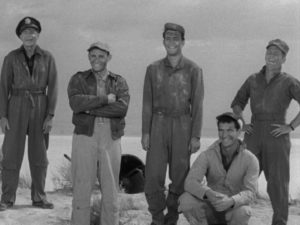Technical Specs
Director: Buzz Kulik
Writer: Rod Serling
Cast: Bob Cummings, Gene Lyons, Paul Lambert, and Jenna McMahon
Composer: Fred Steiner
Air Date: 9/30/1960
Production Code: 173-3639
Overview
After crashing King Nine—a World War II B-25 Mitchell bomber—in a desert, Captain James Embry (Bob Cummings) awakens in a disoriented, amnesiac state. Unable to locate his subordinates, Embry finds himself tormented by hallucinations of missing crewman.
his subordinates, Embry finds himself tormented by hallucinations of missing crewman.
Essentially a remake of “Where Is Everybody?” from season one, “King Nine Will Not Return” examines the harrowing impact of prolonged isolation on the human psyche; but with a twist. Though hampered by a weak conclusion, this episode will appeal to viewers who enjoy The Twilight Zone for its resonating commentary on the human condition.
Pros
Despite initially attempting to rationalize the bizarre nature of his predicament, Embry later surmises that he must be either dead or insane when taunted by a mirage of his supposedly  deceased crew—an unsettling image that prompts a somber but realistic transformation in the main character; specifically, the captain bursts into a fit of deranged, uncontrollable laughter before witnessing his men appear and vanish within a matter of seconds, after which Embry falls to the ground as if defeated by his perceived failings as a military leader. Embry’s slow descent into madness is made credible by the convincing manner with which Bob Cummings portrayed an Air Force captain on the verge of mental collapse, a performance that effectively carries the majority of Rod Serling’s narrative.
deceased crew—an unsettling image that prompts a somber but realistic transformation in the main character; specifically, the captain bursts into a fit of deranged, uncontrollable laughter before witnessing his men appear and vanish within a matter of seconds, after which Embry falls to the ground as if defeated by his perceived failings as a military leader. Embry’s slow descent into madness is made credible by the convincing manner with which Bob Cummings portrayed an Air Force captain on the verge of mental collapse, a performance that effectively carries the majority of Rod Serling’s narrative.
Cons
 As opposed to the aforementioned “Where Is Everybody?,” “King Nine Will Not Return” never bothers to generate tension from the desolate surroundings in which a lone protagonist is forced to dwell. Inner monologues are instead used to convey the paranoia and overwhelming guilt central to Embry’s character; however, an expository approach to suspense-building proves to be a poor substitute for interaction between one man and his environment (e.g. talking to mannequins, pondering the meaning of life while staring into a mirror, etc.).
As opposed to the aforementioned “Where Is Everybody?,” “King Nine Will Not Return” never bothers to generate tension from the desolate surroundings in which a lone protagonist is forced to dwell. Inner monologues are instead used to convey the paranoia and overwhelming guilt central to Embry’s character; however, an expository approach to suspense-building proves to be a poor substitute for interaction between one man and his environment (e.g. talking to mannequins, pondering the meaning of life while staring into a mirror, etc.).
Analysis
In addition to its insightful message regarding the value of companionship in challenging scenarios, “King Nine Will Not Return” explores the horrific ways that survivor syndrome can  afflict even the most remarkable of men. Note that in spite of having no food and a minimal water supply, Embry primarily concerns himself with locating those under his command rather than returning to safety—a sad testament to the self-imposed torture experienced by many soldiers who, through no fault of their own, avoid making the ultimate sacrifice in battle only to bear the burden of responsibility for fallen comrades upon transitioning to civilian life.
afflict even the most remarkable of men. Note that in spite of having no food and a minimal water supply, Embry primarily concerns himself with locating those under his command rather than returning to safety—a sad testament to the self-imposed torture experienced by many soldiers who, through no fault of their own, avoid making the ultimate sacrifice in battle only to bear the burden of responsibility for fallen comrades upon transitioning to civilian life.
Concluding Comments
“King Nine Will Not Return” makes thought-provoking use of a decidedly thin concept. A number of poignant monologues delivered by Cummings will especially intrigue fans of The Twilight Zone, though Serling’s uncharacteristically dull twist ending may fail to satisfy audiences with high expectations.
Overall Quality: 7/10
If you enjoyed this post, please click the follow button or enter your email address in the subscription box to stay tuned for more updates.
